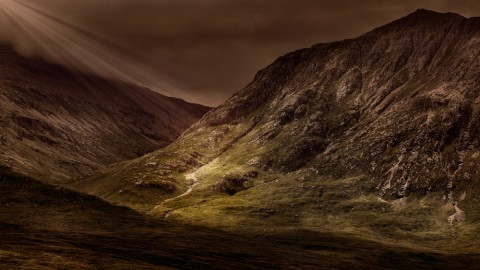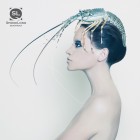My boy is the beacon in the ache this land calls fields. He loses himself in the bush and the burrows. No man has been buried here since God dug us into the world, wanting us to spread out. I am laying seed far from the laps of my fathers. The valley is eager for me to become a valley myself, for other people to pass through.
My boy will bury me in the clogged turf and more of the lonely will come. Either that, or he will have no one to see him into the earth. We are farming on the remnants of nothing that came before us.
Somewhere beyond the ridges, keeping us from the worst of the wind, I can feel the ocean having its own summer. We have climbed the ridges twice, me and my boy, to look into the gulf we crossed and cannot cross again. I have never told him about the word ‘return’. We left our books behind us so that our language would be our own. I have taught him that running is to live as wildfire, which outstrips even the ancient woods.
My wife and I made love last night. The timber groaned with the fret of weather. We had to stop for fear. I knew then that we are making our own way in the world.
I do not know what is more frightening, the prospect of a figure appearing on the horizon, or the prospect of no one appearing forever. I watch the hot flies folding across the copse, like bed linen thrown out in frustration, and think about how, when they move in bulk, they have no edges to them. Not like my boy. His outline is sharper than anything I’ve seen.
My wife was lamenting the fact he has no one to grow up with. I explained that there are spirits in the cliffs, on the peaks, down by the brook, on the beaches we’ve not yet walked on, and when the sun climbs that alone is enough company for one day, but she swung her lamp, hoping to cause pain, the arch it made as it came towards me like a whip of light in the dark. I stepped back and told her that if our house burns down then no one will make it through.
I remember arguments we’ve had out in the fields, the noon blaze making her shouts seem like a parched daydream, her arms in the air, a fury of butterflies around us and no food, an alien birdsong in the thicket that distracts me from her raving, and when she sees from my eyes that I am thinking of the strange, hidden colours of nature she kicks the earth as if it needs to open up and give us something better, and I continue listening to the bird without a name. My boy watches us fight it out from the safe distance of shade.
If we argue in the day then we come together at night. I can feel her passion in the same way you feel fear when you lose your footing in a rockpool. Sometimes we could fill Hell with the sweat we put into love and living.
My boy asked me how he was going to feed himself after I died. I sharpened two switches of wood and told him to follow me to the water’s edge, into the pebbled dip, where a trunk has fallen in the stream to form a pool that’s never quite still. I showed him how to spot fish, the glint of scales like the eyes of a cat, the moving shadows beneath, and how to strike as if all life is earned through surprise. I demonstrated as he looked on, mute, from the bank, my trousers rolled up, ankles freezing, and when I caught my reflection in the chopped water I thought I was seeing my own father, and wondered if that meant I’m far too old for everything.
I told my boy to take my place in the stream. He struggled with the cold and said to me ‘I hope you never die because this is all too hard’. With the fish obliviously brushing his shins he struck, no might and no aim, and I was proud because he failed bravely, worried because he might not last the week.
When I carried him across the threshold of our house my wife screamed, for we were both bathed in blood. My boy was limp and pale. He had slipped in the river, the spear pirouetting into his left shoulder. He did not cry out. He said it hurt less than the cold.
We’ve dressed the wound and laid him in our bed. My wife heats up milk and tells him there is only peace because of pain, which we both know to be untrue, but I can see panic in his eyes even though, under the still dusk, he tries to let me think he’s not afraid.
The blood has clotted in the candlelight. He is not yet feverish. The edgeless, afternoon flies have given way to edgeless sounds in the night, the spirits that might see us through. I cannot meet my wife’s gaze.

Notes from Guest Reader Christopher Allen
This story is stunning in its layers. It’s grand but also nuclear. The father’s reverence for nature, the boy’s existential fear, the mother’s anger–these are all so real and stirring.


 The core workshop of SmokeLong Fitness is all in writing, so you can take part from anywhere at anytime. We are excited about creating a supportive, consistent and structured environment for flash writers to work on their craft in a community. We are thrilled and proud to say that our workshop participants have won, placed, or been listed in every major flash competition. Community works.
The core workshop of SmokeLong Fitness is all in writing, so you can take part from anywhere at anytime. We are excited about creating a supportive, consistent and structured environment for flash writers to work on their craft in a community. We are thrilled and proud to say that our workshop participants have won, placed, or been listed in every major flash competition. Community works.